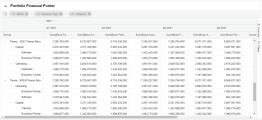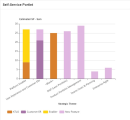Preconfigured self-service portlet data sources
This topic introduces the preconfigured self-service portlet data sources that are ready for use.
Financial Costs
This section introduces the preconfigured Financial Costs data source.
The Financial Costs data source provides financial costs related data. You can use this data source in the self-service portlet to display financial costs for projects, programs, portfolios, assets, and proposals.
You must have either of the following licenses to use this data source:
-
Demand Management license
-
Project Management license
-
Program Management license
-
Portfolio Management license
-
Configuration license
Financial Costs data source columns
The following table lists the columns in the Financial Costs data source. You can use these columns in the self-service portlet to display the financial costs for a desired entity.
| Column | Description |
|---|---|
| Base Actual Cost | Select this column if you want the self-service portlet to include the entity's actual cost in the base currency. |
| Base Forecast Cost |
Select this column if you want the self-service portlet to include the entity's forecast cost in the base currency. |
| Category |
Select this column if you want to display cost category in the self-service portlet. The cost category includes: Contractor, Employee, Hardware, Software, and Training. |
| Expense Type |
Select this column if you want to display the cost expense type in the self-service portlet. The expense type includes Operating and Capital. |
| Labor Type |
Select this column if you want to display the cost labor type in the self-service portlet. The labor type includes: Labor and Non-Labor. |
| Line ID |
Select this column in the Pivot Mode of the Grid view, when you want to display multiple information for a cost line. The Line ID combines in one column, the information of the following columns, in sequential order from left to right:
You can select which of the above information is included in the Line ID column by selecting the relevant columns. Example: A cost line has the following properties:
If you select these columns: Category, Labor Type, User data, and Line ID, the Line ID column displays: Employee, Labor, ABC If you select these columns: Category, Labor Type, Expense Type, Source, and Line ID, the Line ID column displays: Employee, Labor, Capital, Staffing Profile |
| Local Actual Cost |
Select this column if you want the self-service portlet to display the entity's actual cost in the local currency. |
| Local Forecast Cost |
Select this column if you want the self-service portlet to display the entity's forecast cost in the local currency. |
| Month |
Select this column if you want to display the financial costs by month in the self-service portlet. |
| Name |
Select this column if you want to display the name of the entity and its contents (if any). This enables you to view the financial costs of an entity's contents. |
| Quarter |
Select this column if you want to display the financial costs by quarter in the self-service portlet. |
| Source |
Select this column if you want to display the cost source in the self-service portlet. The cost source is where the cost comes from: rolled up from staffing profiles, work plans, time sheets, or is manually added. For portfolios and programs, the cost can also be rolled up from their contents. |
| Type |
Select this column if you want to display the entity type in the self-service portlet. |
| User data | Select this column if you want to display the cost line user data in the self-service portlet. |
Portfolio Items data source
This section introduces the preconfigured Portfolio Items data source.
The Portfolio Items data source provides portfolio backlog related data. You can use this data source in the self-service portlet to display portfolio information based on specific criteria, including strategic theme, status, health, and so on.
You must have the Portfolio Management license to use this data source.
KPIs
The KPIs data source provides KPI related information. You can use this data source in the self-service portlet to display KPI information based on specific criteria, such as strategic themes and business goals.
Staffing Profile Statistics
The Staffing Profile Statistics data source can be used to display and analyze the demand, allocation, and fulfillment of your team or staffing profile. It provides the following data viewing options:
- By roles or projects
- In different effort types: Hours, Persons Days, or FTE
- Across various period types: Month, Quarter, Half Year, or Year
Using the Staffing Profile Statistics data source has the following limitations:
- If a team has multiple sub-team levels, only the current team and its direct sub-team are displayed. Allocations for level three and higher sub-teams are rolled up to the level two team.
-
When the effort type is set to Full Time Equivalent (FTE), Demand, Fulfilled Demand, or Unmet Demand values may vary depending on the selected time period. For example, if a position has a demand of 2 FTEs in August and September, but none in July and October, selecting August to September will show 2 FTEs of demand for this period, whereas selecting July to October will show approximately 1 FTE.
If you use effort types like Person Days or Hours, the Demand, Fulfilled Demand, and Unmet Demand value remains constant regardless of the time period selected.
-
In some cases, Percentage Fulfilled (%) may not display as expected. For example, when using the Card chart to show overall percentage fulfilled for a period, it will show a sum instead of an average.
 See also:
See also:










